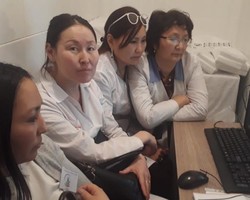Svetlana Gogoleva: connecting with cancer patients in distant locations

Russian Nurses Association
Providing patients with the best possible quality of care sometimes requires finding new and innovative ways to meet their needs. Nurses are often at the forefront of designing and implementing these new approaches, leading the way for other health workers involved in care.
Svetlana Gogoleva, Chief Nurse at the Republican Oncology Dispensary in Yakutia Republic, Russian Federation, has played a leading role in introducing electronic consultations (e-consultations) to bring care closer to patients in distant locations.
Yakutia Republic is the largest geographic region of the country, occupying one fifth of its territory, and home to nearly 1 million people. Its continental climate means that temperatures can vary widely, with a range of more than 100 degrees centigrade throughout the year. Transportation is limited, and local aviation is the only means of reaching many districts for a large part of the year.
Many people are fighting cancer amid these challenging conditions. Nearly 2500 new cancer cases were recorded among the Yakutian population in 2017, and the region has a total of nearly 12 000 cancer patients.
In an effort to reach these patients, Svetlana and her team at the Dispensary began using telemedicine to provide e-consultations between nurses and patients, between doctors and patients, and also among health professionals. These e-consultations allow them to bring quality care closer to their patients, particularly those in remote districts.
E-consultations are organized by a 2-person team including the doctor in charge of the district hospital and a nurse, and all communication occurs in real time. During these e-consultations, patients can describe their health issues and receive feedback from the doctor about necessary actions and treatment. Nurses can provide additional details and answer patients’ questions.
During nurse-to-nurse e-consultations, nurses from the Dispensary often train district nurses on different aspects of cancer care, such as the use of chemotherapy and how to prevent side effects.
In 2017, the Dispensary organized 33 e-consultations and provided training to 265 nurses. This method proved effective in connecting Dispensary staff with the distant Arctic territories, improving the quality of nursing care, increasing patient adherence to recommended treatments and regimens, decreasing the number of patients dissatisfied with their care, and strengthening patients’ self-care skills.



